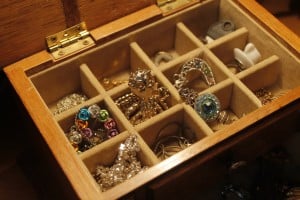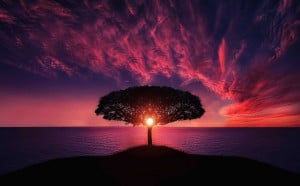 Twirling in the Middle: The Dawn of Henotheism
Twirling in the Middle: The Dawn of Henotheism
In the middle of history of polytheism and monotheism lies henotheism and its many forms. Henotheism is seldom used in current speech and/or writings describing how coexistence of many beliefs under one society twirls in the middle to form tolerance and acceptance: a society, such as the late Alexandria Egypt and my very own country of paternal origin, Haiti.
Before I begin, I consider myself eclectic in my belief of Paganism with blend of Catholicism -Christianity. My parents are both Haitian while I am 1stgeneration Haitian-born American. Henotheism has always been my belief “system” since the beginning of my earliest remembrance. It was second nature for me to worship the Abraham God on Sunday mornings and Monday and Wednesday afternoon at my CCD class (Confraternity of Christian Doctrine) of my maternal religious belief. The rest of the days, months, time of day, or season I was introduced to several of gods and goddesses from many culture of my paternal side. More specifically, my father is a hereditary Vodouisant who appreciates and reveres many deities and pantheon from many cultures and many times. It wasn’t odd or conflicting that on May Day paying homage to Freya, Norse Goddess, in mid-afternoon. However, if May Day fell on a Sunday to pay homage, as well, to the God of Abraham of my mother. My parents set up specific times using the position of the sun to have not these entities conflicted. Another “guideline” is to pay homage to the deity that beckons me the most to pay attribute but first I must inform the others or make negotiation with the others that “this day is set aside for (fill in the blank of deity). However, I will give you my undivided attention on (fill in the blank with alternative day)”
There is a “non-spoken code” within the African Traditionalist Religion community regarding speaking to outsiders. For so long I’ve kept quiet while commenting on various blogosphere and pagan community news outlet. I hope sharing my views, which is not at all stating that ALL African-Traditionalist share similar views will shed some light on the mysteries of Haitian Vodou and other African based religion.
For the most part I’ve read numerous times that Vodou is a monotheistic religion. Yes, there are Vodou practitioners that believe in one Supreme god who may or may not be distant. They call upon the loa and/or ancestors to intercede with earthly matters. Similar to how Catholics call upon the saints to intercede or produce miracles without denying that they are only mediums. Some Vodou practitioners view Vodou as a polytheistic religion with the loas compared to equal standing deities as of Olympians and the Titans [in Haiti there is the Petro pantheon and the Rada pantheon] Just some loa may beckon them closer than others or used during special circumstances than the other. Similar to acknowledging Zeus as Supreme but rarely calling or offering liberation to him for their matron deity is Athena, for an example.
Then you have the henotheist who may or may not combine kathenotheism. I view Haiti as a henotheist society with blending of kathenotheist. A society that acknowledges one god or gods but doesn’t discredit the rest [henotheism] or only worships one god at a time [kathenotheism] pending on feast days, holy days, seasons, days of the week, time of day, or other circumstances. It is not conflicting for Vodou practitioners to attend church sermons on Sunday and set aside for Ezili Freda on Thursday. As it is not conflicting for me to honor the love loa/goddess Ezili Freda on Thursday and honor Norse goddess of love on Friday.
There is a saying that Haiti is 100% Vodou: such saying is not quiet accurate. My mother is a non-Vodou believer but she doesn’t discredit the loas. She simply feels they do not “call” for her as much as Saint Frances Xavier Cabrini does. I recall her telling me, “I never really had ‘the calling’” Even today; still being Christian she doesn’t discredit Buddha or Mohammad. Likewise, with many Haitians who respect those who blend Catholicism with African-Traditional religion (Vodou) and those who don’t blend. There isn’t as much as an either/or in Haitian society… sadly, it seems as of late there has been a “push” towards the “Us vs. Them” Nevertheless, the Haiti that I knew and visited as a child was pretty much accepting. Now, do one believer feel that their deity is “powerful” than the other? Of course, yet matters of “superiority” were held within “cheek and tongue” (if you have nothing nice to say than don’t say anything at all).
Even within the Vodou pantheon there are deities of Celtic, Norse, Babylonia, Sumerian, and the list is endless. Again pending on the practitioner and his or her ancestry. What I speak of ancestry is bloodline. In my bloodline there is Taino Native islander [Taino being the native that inhabit the island of Haiti eons ago] and therefore, I have Taino loa in my pantheon as well as my bloodline. In some of my worship there is Native spirituality impart of the connection of the loa and bloodline. Simultaneously there is ancestry of an Arab. Although the Arab medium/god[dess]/loa or what have you does not speak to me. He/she speaks to my father who keeps a Quran by his bedside along with the Christian bible. There is Islamic “spirituality” that he keeps: such as non-eating of any pigs. Sometimes he takes it to the extent of any meat not killed by a Muslim. My father explained to me that the particular medium that he has protecting him ask this of him. My father complies. I grew up believing that Muslim Allah and Judeo-Christian God are One but there is difference in worship or stories [Starting with when Hagar left the house of Abraham].
I also grew up, with my father guiding me, that Roman Minerva and Greek Athena are two different goddesses but can act as one. The only time I shall blend the two goddesses as one is in my academic studies for assistance [even this piece]. However, to acknowledge their differences, as well. From my father I learned the closest goddess comparison to Minerva is “in all actuality” the Celtic Brigid known for hearth, childbirth, healing and poetry. Finally from the Celtic Brigid I learned such healers doesn’t necessarily mean eternal life but eternal life after death or healing of death through life—which brings us back to Haiti’s Maman Brigitte the goddess of the cemetery that leads to a new life.
It comes in circles for henotheist, like me. Acknowledging the gods of other cultures and societies while paying homage to “our” own. Or even paying homage to gods of other cultures and societies— by means of worshipping them one-at- a time [kathenotheism].
Henotheism and henotheist are very much alive today (as well with kathenotheism and kathenothist)—we tend to twirl in the middle of “us vs. them” “black or white” and “either-or” We are called eclectic, eccentric, centrist, moderate and/or progressive… even confused: trust me, confuse we are not…. we simply twirl in the middle of left and right.











